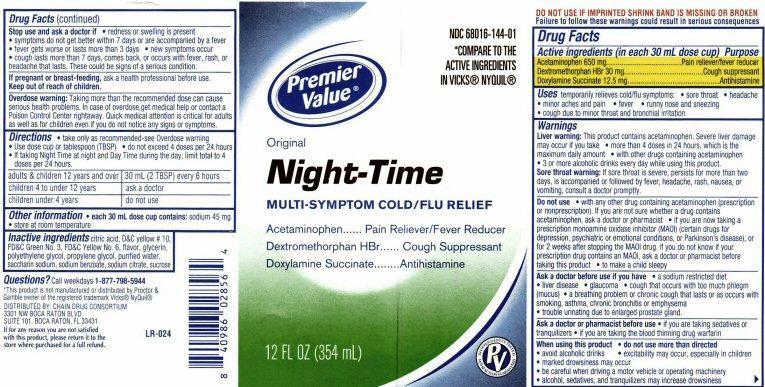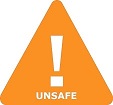Night-time Original Multi-symptom Cold/flu Relief while Breastfeeding

What is Night-time Original Multi-symptom Cold/flu Relief used for?
Brief: Pain reliever/fever reducer Cough suppressant Antihistamine
Is using Night-time Original Multi-symptom Cold/flu Relief unsafe in breastfeeding? Can there be bad consequences for baby if I use it while breastfeeding?

Night-time Original Multi-symptom Cold/flu Relief Breastfeeding Analsys
Acetaminophen while Breastfeeding
SafeCAS Number: 103-90-2
Excreted in very low amount into breast milk. Infant intake may be lower than 4% of usual pediatric dose. The American Academy of Pediatrics rates it as compatible with Breastfeeding.
Dextromethorphan hydrobromide while Breastfeeding
SafeCAS Number: 125-71-3
Cough suppressant related with morphine and codeine which is lacking of analgesic or sedative properties. Commonly prescribed by pediatricians. On latest update relevant data on breastfeeding was not found. Because reported low toxicity and mild side effect it is considered to be safe while breastfeeding. Frequently associated to caffeine and other products that are usually compatible with breastfeeding. Avoid use of multiple drug and alcohol containing medication.
Doxylamine succinate while Breastfeeding
UnsafeCAS Number: 469-21-6
It is a first generation antihistamine drug which is related to ethanolamine, with sedative and anti-muscarinic effects. It has been used as hypnotic and for vomiting relief. At latest update, relevant published data on excretion into breast milk were not found. Pharmacokinetic characteristics would favour that it may be excreted into breast milk in significant amount. On a telephone survey, 10% of infants whose mothers were on several types of antihistamine medication have suffered of colicky pain and irritability that disappeared without treatment. For both treatment of mothers and infants would be safer the use of tested antihistamine medication without sedative effect, especially in prematures and infants younger than 1 month of age. Whenever used while breastfeeding, the use of the lower effective dose and for the shortest time as possible is recommended. Follow-up for somnolence and feeding troubles should be warranted. Bed-sharing is not recommended when the mother is on this medication.
Night-time Original Multi-symptom Cold/flu Relief Breastfeeding Analsys - 2
Acetaminophen while Breastfeeding
CAS Number: 103-90-2
Acetaminophen is a good choice for analgesia, and fever reduction in nursing mothers. Amounts in milk are much less than doses usually given to infants. Adverse effects in breastfed infants appear to be rare.
Dextromethorphan hydrobromide while Breastfeeding
CAS Number: 125-71-3
Neither the excretion of dextromethorphan in milk nor its effect on breastfed infants have been studied. It is unlikely that with usual maternal doses amounts in breastmilk would harm the nursing infant, especially in infants over 2 months of age. It is best to avoid the use of products with a high alcohol content while nursing.
Doxylamine succinate while Breastfeeding
CAS Number: 469-21-6
Small occasional doses of doxylamine would not be expected to cause any adverse effects in breastfed infants. Larger doses or more prolonged use may cause drowsiness and other effects in the infant or decrease the milk supply, particularly in combination with a sympathomimetic such as pseudoephedrine or before lactation is well established.
What should I do if I am breastfeeding mother and I am already exposed to Night-time Original Multi-symptom Cold/flu Relief?
We have already established that Night-time Original Multi-symptom Cold/flu Relief is unsafe in breastfeeding and breastfeeding while using Night-time Original Multi-symptom Cold/flu Relief is not a good idea however if have already used
My health care provider has asked me to use Night-time Original Multi-symptom Cold/flu Relief, what to do?
If your doctor knows that you are breastfeeding mother and still prescribes Night-time Original Multi-symptom Cold/flu Relief then there must be good reason for that as Night-time Original Multi-symptom Cold/flu Relief is considered unsafe, It usually happens when doctor finds that overall advantage of taking
If I am using Night-time Original Multi-symptom Cold/flu Relief, will my baby need extra monitoring?
Yes, Extra monitoring is required if mother is using Night-time Original Multi-symptom Cold/flu Relief and breastfeeding as it is considered unsafe for baby.
Who can I talk to if I have questions about usage of Night-time Original Multi-symptom Cold/flu Relief in breastfeeding?
US
National Womens Health and Breastfeeding Helpline: 800-994-9662 (TDD 888-220-5446) 9 a.m. and 6 p.m. ET, Monday through Friday
UK
National Breastfeeding Helpline: 0300-100-0212 9.30am to 9.30pm, daily
Association of Breastfeeding Mothers: 0300-330-5453
La Leche League: 0345-120-2918
The Breastfeeding Network supporter line in Bengali and Sylheti: 0300-456-2421
National Childbirth Trust (NCT): 0300-330-0700
Australia
National Breastfeeding Helpline: 1800-686-268 24 hours a day, 7 days a week
Canada
Telehealth Ontario for breastfeeding: 1-866-797-0000 24 hours a day, 7 days a week
